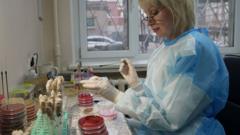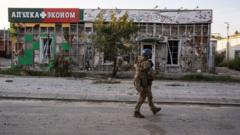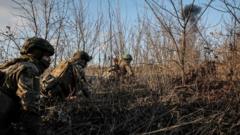As Ukrainian hospitals face a dramatic increase in drug-resistant infections, healthcare professionals struggle to maintain hygiene and treatment standards. Amidst pressing demands of war, the evolving nature of bacteria poses a dire challenge to medical efforts, endangering lives and complicating treatment strategies.
Ukraine Faces Surge of Drug-Resistant Infections Amid Ongoing Conflict

Ukraine Faces Surge of Drug-Resistant Infections Amid Ongoing Conflict
The war in Ukraine exacerbates the spread of antimicrobial resistance, leaving medical facilities overwhelmed and patients vulnerable.
Article:
When Pte Oleksander Bezverkhny was airlifted to Feofaniya Hospital in Kyiv, few anticipated he would survive. The 27-year-old sustained grave injuries—a severe abdominal wound and shrapnel damage to his lower body that necessitated amputation of both legs. Shortly after, doctors faced an even bigger challenge: his infections were resistant to standard antibiotics.
Antimicrobial resistance (AMR) occurs when bacteria adapt and become impervious to antibiotics, rendering treatment futile. Ukraine is not alone in grappling with this crisis; in 2021, global AMR infections claimed around 1.4 million lives, with the UK reporting over 66,000 serious antibiotic-resistant cases in 2023. However, the war has escalated the spread of multi-resistant pathogens within Ukraine.
Hospitals treating war casualties have seen a startling rise in AMR occurrences. Dr. Andriy Strokan, deputy chief physician at Feofaniya Hospital, stated that over 80% of patients admitted suffer from antibiotic-resistant infections. Paradoxically, these infections frequently originate in medical settings, where overwhelmed facilities struggle to uphold strict hygiene protocols.
Dr. Volodymyr Dubyna, head of the Mechnikov Hospital’s ICU, noted that his unit expanded from 16 to 50 beds since the onset of the Russian invasion. Simultaneously, staffing shortages arose as medical personnel fled the war or enlisted in the military, further complicating efforts to control infection spread.
In surgical wards, a single nurse often tends to 15-20 patients, making it nearly impossible to adhere to required hygiene standards, which accelerates infection propagation. The nature of military life exposes injured soldiers to an array of infections as they are transferred between multiple facilities, amplifying their risk of AMR.
For Pte Bezverkhny, his journey included treatment at three different hospitals before arriving in Kyiv. With standard medicines failing, his health deteriorated, and he dealt with sepsis five times as a direct consequence. The current state of care substantially differs from past conflicts, such as Afghanistan, where injured soldiers were stabilized for immediate air transfer to European centers, mitigating the spread of infections.
In Ukraine, hospitals face an unprecedented patient influx reminiscent of World War II. Once stabilized, patients can only be transferred to other facilities if space permits, continuing the chain of bacterial transmission. Consequently, the medical system is often unable to isolate infected individuals, allowing multi-resistant strains to proliferate unimpeded.
When patients do contract these dangerous infections, they require rare "reserve" antibiotics for treatment. However, frequent use of these crucial medications accelerates bacterial adaptation and resistance, making the challenge of effective treatment even steeper.
Dr. Strokan emphasized the need for a delicate balance: preserving patient lives while not exacerbating the emergence of resistant microbes. In Pte Bezverkhny's case, medical teams resorted to expensive antibiotics sourced from international volunteers. After enduring a year in hospital and undergoing over 100 surgeries, he is now out of immediate danger, yet the battle against evolving pathogens continues for others in similar predicaments.
When Pte Oleksander Bezverkhny was airlifted to Feofaniya Hospital in Kyiv, few anticipated he would survive. The 27-year-old sustained grave injuries—a severe abdominal wound and shrapnel damage to his lower body that necessitated amputation of both legs. Shortly after, doctors faced an even bigger challenge: his infections were resistant to standard antibiotics.
Antimicrobial resistance (AMR) occurs when bacteria adapt and become impervious to antibiotics, rendering treatment futile. Ukraine is not alone in grappling with this crisis; in 2021, global AMR infections claimed around 1.4 million lives, with the UK reporting over 66,000 serious antibiotic-resistant cases in 2023. However, the war has escalated the spread of multi-resistant pathogens within Ukraine.
Hospitals treating war casualties have seen a startling rise in AMR occurrences. Dr. Andriy Strokan, deputy chief physician at Feofaniya Hospital, stated that over 80% of patients admitted suffer from antibiotic-resistant infections. Paradoxically, these infections frequently originate in medical settings, where overwhelmed facilities struggle to uphold strict hygiene protocols.
Dr. Volodymyr Dubyna, head of the Mechnikov Hospital’s ICU, noted that his unit expanded from 16 to 50 beds since the onset of the Russian invasion. Simultaneously, staffing shortages arose as medical personnel fled the war or enlisted in the military, further complicating efforts to control infection spread.
In surgical wards, a single nurse often tends to 15-20 patients, making it nearly impossible to adhere to required hygiene standards, which accelerates infection propagation. The nature of military life exposes injured soldiers to an array of infections as they are transferred between multiple facilities, amplifying their risk of AMR.
For Pte Bezverkhny, his journey included treatment at three different hospitals before arriving in Kyiv. With standard medicines failing, his health deteriorated, and he dealt with sepsis five times as a direct consequence. The current state of care substantially differs from past conflicts, such as Afghanistan, where injured soldiers were stabilized for immediate air transfer to European centers, mitigating the spread of infections.
In Ukraine, hospitals face an unprecedented patient influx reminiscent of World War II. Once stabilized, patients can only be transferred to other facilities if space permits, continuing the chain of bacterial transmission. Consequently, the medical system is often unable to isolate infected individuals, allowing multi-resistant strains to proliferate unimpeded.
When patients do contract these dangerous infections, they require rare "reserve" antibiotics for treatment. However, frequent use of these crucial medications accelerates bacterial adaptation and resistance, making the challenge of effective treatment even steeper.
Dr. Strokan emphasized the need for a delicate balance: preserving patient lives while not exacerbating the emergence of resistant microbes. In Pte Bezverkhny's case, medical teams resorted to expensive antibiotics sourced from international volunteers. After enduring a year in hospital and undergoing over 100 surgeries, he is now out of immediate danger, yet the battle against evolving pathogens continues for others in similar predicaments.






















